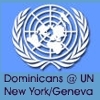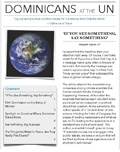

| BRIEFING - June 18, 2014 | To learn more about the Millenium Development Goals, click on the graphic Read the latest “Dominicans at the UN” newsletter Past Briefings: June 4, 2014 May 7, 2014 April 9, 2014 March 19, 2014 March 5, 2014 Feb 19, 2014 Jan 8, 2014 Nov 22, 2013 Oct 23, 2013 Oct 9, 2013 Sept 25, 2013 Sept 11, 2013 July 10, 2013 June 26, 2013 June 12, 2013 May 8, 2013 April 24, 2013 |
|
Special rapporteur on Right to Food concludes final term By Abby McCrary, Dominican Volunteer Olivier de Schutter recently concluded his second and final term as the UN Special Rapporteur on the Right to Food. Special rapporteur positions are given their mandate by the UN Council on Human Rights as impartial observers who “examine, monitor, advise, and publicly report” on the human rights dimensions of their field. Since taking the position in 2008, de Schutter has connected global trends in food systems, and highlighted the systemic challenges therein. He has called for bold changes, such as the move toward food sovereignty, which would allow for communities to take back control and ownership of their own food systems rather than being dependent upon the fluctuations of global trade or unilateral food aid. The local agricultural knowledge and ability of a community to feed itself sustainably is, de Schutter believes, a necessary condition for the full realization of the right to food. De Schutter shared reflections as his term came to an end:
With de Schutter’s valuable analyses and contributions, the conversation on food has become a fuller, more integrated one. He has skillfully woven together threads from science and climate change, tradition and indigenous wisdom, countries rich and poor, urban and rural contexts. Rather than being driven by the singular quest to produce more and more food, de Schutter created space for objectives such as supporting small-holder farmers to invest in their local food systems, the quality and sustainability of the soil and water, and supplying diverse, culturally-appropriate foods to vulnerable communities. De Schutter has articulated a deep understanding of the interconnectedness the rights of people and planet as the foundation for a sustainable food system. This is the true meaning of food justice. De Schutter will be succeeded in his position as Special Rapporteur on the Right to Food by Professor Hilal Elver, a Turkish academic based at the University of California at Santa Barbara, and a specialist on environmental issues and climate change. Read Olivier de Schutter’s Final Report to the UN Human Rights Council
|
Dominican Leadership Conference
Building relationships and collaborating in the mission of preaching the Gospel
29000 West Eleven Mile Road
Farmington Hills MI 48336
248-536-3234 Contact: Executive Director

